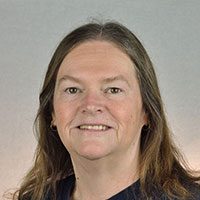Bio
Courses I taught
ENGL/LING 2190: Introduction to Linguistics
ENGL/LING 5240: Literacy: Issues and Methods for Teaching Nonnative Speakers of English
ENGL/LING 5880: Supervised Practice Teaching in Teaching English as a Second Language
ENGL 1010D (English for Native Speakers of Other Languages: Academic English II—Graduates)
ENGL/LING 3240 (Introduction to Teaching ESL Literacy)
ENGL/LING 4200 (History of the English Language),
ENGL/LING 5270 (Discourse Analysis), and seminars on Systemic Functional Linguistic applications to research.
Research areas
Oral academic language development in the content areas, writing development, project-based language teaching, formative assessment of language development (all using Systemic Functional Linguistic theory).
About my teaching
I value the explicit connection between theory and practice in the classroom and thus strove to create and use hands-on activities so that students could reflect on what they were learning and see how it may apply to their own lives.
How I came to teach what I taught
I’ve always been interested in teaching, right from a young age where I used to play school with my best friend—and I’d always play the teacher! In my undergraduate program, however, I quickly became captivated by the field of linguistics and so changed my degree program to reflect that. Once I graduated, I spent several years working in the language teaching area in Japan, both as an English teacher in business contexts and as a developer of teaching materials. I published my first two books through Macmillan LanguageHouse in Japan. I returned to Western Canada (where I am from) and headed to graduate school to formalize and learn more about the concepts I had been working with. I took a course from Bernard Mohan and became hooked on Systemic Functional Linguistics in general, and Mohan’s knowledge framework in particular. I used these theoretical perspectives in both my MA thesis, which examined how cause was constructed linguistically in written explanations of the water cycle, and in my PhD research, which examined four classroom contexts (grades one/two and nine, both ESL and native English speakers) for oral causal explanations. Through this work, I could easily see how working orally with students can lead to higher academic literacy.
Publications
Gleason, J.S., & Slater, T. (2016). Patterns of tasks, patterns of talk: L2 literacy building in university Spanish classes. Language, Culture, and Curriculum, DOI: 10.1080/07908318.2016.1195398
Slater, T., & McCrocklin, S. (2016). Learning to use simplified systemic functional grammar to teach literary analysis. In L.C. de Oliveira & M. Shoffner (Eds.), ELA teachers and ELL students: Preparing English language arts teachers to teach English language learners (pp. 193-214). London, UK: Palgrave Macmillan.
Ma, H., & Slater, T. (2016). Connecting Criterion score and classroom grading contexts: A systemic functional linguistic model for teaching and assessing causal language. CALICO Journal, 33 (1), 1-18.
Slater, T., Levis, G., & Levis, J. (2015). Spoken parentheticals in TA and ITA instructional discourse in Social Science and STEM disciplines: The interaction of intonational, ideational, and interpersonal resources in signaling information structure. In G. Gorsuch (Ed.), Talking matters: Research on talk and communication of international teaching assistants (pp. 3-32). Stillwater, OK: New Forums Press.
Ma, H., & Slater, T. (2015). Using the developmental path of cause to bridge the gap between AWE scores and writing teachers’ evaluations. Writing and Pedagogy 7(2/3), 395–422.
Slater, T., & Butler, J.I. (2015). Examining connections between the physical and the mental in education: A systemic functional linguistic analysis of a PE teaching and learning register. Linguistics and Education, 30, 12-25.
Park, M., & Slater, T. (2014). A typology of tasks for MALL: Recommendations from a small-scale needs analysis. TESL Canada Journal/Revue TESL du Canada, 31(8), 93-115.
Current research
As well as being very interested in the work my graduate students are undertaking, I am currently examining and comparing the perspectives of multilingual graduate students and their instructors regarding their graduate writing course. I am also planning a major research project to extend my PhD work; this time I am planning to collect discourse data from middle school science classes to see how language and content are developing in that context.
Outside of the University
I have two dogs that I love spending time with. I also love reading mystery novels and watching NHL hockey (Go Canucks Go!).

